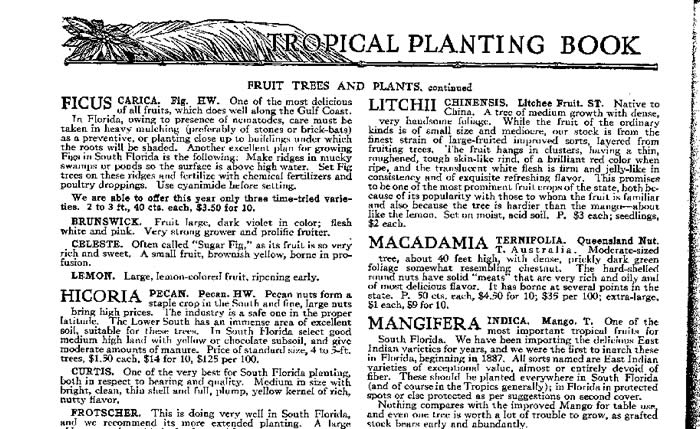From Lychees Online
by Krystal Folino and Bill Mee
Origin of Lychees
An attractive and rare sub tropical fruit tree that bears a
luscious red fruit, the Lychee originated over 2000 years ago first in
the north tropical rainforests and mountain forests of Southern China,
where it is a dominant tree species.
The second place wild
lychee trees began to emerge was in the southern sub tropical low
elevations of Southern China in the provinces of Guangdong/Kwangtung
and Fujian/Fukien primarily along rivers and near the seacoast. These
lowland lychees are most likely a result of fruit/seeds that were
washed down rivers from the mountains or were transported by birds and
then were deposited naturally in great conditions for lychee growth.
There
are still villages in Southern China today with lychee trees that are
over 1000 years old! There is some evidence to suggest that wild
lychees may have also originated in northern mountain regions of
Vietnam.
Commercial planting and growing of lychees in China is
primarily in the provinces of Guangdong, Gangxi, Hainan, Fujian,
Yunnan, Taiwan and a small, special area of Sichuan/Szechuan with a
unique micro-climate. Guangdong is called 'the Kingdom of Lychee'
because the province has the highest and best lychee production in
China and lychees are grown almost everywhere in the province. In
Guangdong there is a grove that has a lychee production record of over
2000 years!
With the developments in lychee production
techniques and technology in China since the early 1990's lychee
production in China has doubled. More than 1/2 of the acreage of
lychees in China have been planted out since 1994 and 1/3 since 1999.
Lychee
production in China is in primarily the northern tropical and southern
sub tropical climate zones between 19 degrees and 24 degrees north
latitude. The northern tropical climate includes southwestern
Guangdong, Hainan, southern Taiwan and Leizhou Peninsula. The southern
sub tropical climate zone includes central and southern Guangdong and
Guangxi, southeastern coastal Fujian and central, southern and western
coastal Taiwan.
Lychee farming spread from it's native China to
neighboring areas of southeastern Asia and offshore islands, India, the
West Indies, South Africa, Madagascar, then to France and England. The
Lychee spread to Hawaii in 1873 and from there to Florida in 1883, and
then from Florida to California in 1897. However, successful fruiting
of the Lychee tree in the U.S. did not occur until the early 1900's in
southern California. There are currently about 33 varieties growing in
the US, and Lychee trees have now spread to most subtropical and many
tropical areas of the world.
In recent years, Australia has
become a major producer of lychees in Queensland and New South Wales.
Lychee trees were brought to Australia in the 1850's by Chinese gold
miner workers.
Between 1903 and 1906 Reverend W.M. Brewster
imported Chen Tze or Royal Chen Purple lychee trees to South and
Central Florida from the northernmost growing region of Fukien. This
lychee variety/cultivar was renamed Brewster. There is even part of an
original 'Brewster' grove in Davie, Florida.
The most popular varieties grown in South Florida are the Brewster, the Hakip, and the Mauritius.
The first commercial nursery in South Florida to sell lychee trees was Reasoner's Royal Palm Nurseries.
An
image of the original page from the Reasoner's Nursery circa 1924
catalog in shown below. You will note the product item for lychee on
the upper left:

Courtesy Royal Palm Nurseries Archives
by Bill Mee and Krystal Folino - Lychees Online
Back to
Lychee Page
|
|